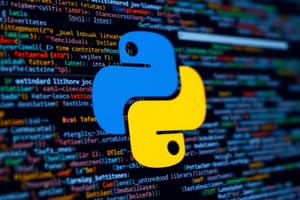Podcast
Questions and Answers
What is the purpose of the built-in modules in Python's standard library?
What is the purpose of the built-in modules in Python's standard library?
- To abstract away platform-specifics into platform-neutral solutions
- To describe the exact syntax and semantics of the Python language
- To provide access to system functionality such as file I/O (correct)
- To encourage and enhance the portability of Python programs
What does the Python Standard Library reference manual describe?
What does the Python Standard Library reference manual describe?
- The standard library distributed with Python (correct)
- The exact syntax and semantics of the Python language
- The optional components commonly included in Python distributions
- The facilities offered by built-in modules
What do the modules written in Python in the standard library provide?
What do the modules written in Python in the standard library provide?
- Standardized solutions for many problems in everyday programming (correct)
- Exact syntax and semantics of the Python language
- Access to system functionality such as file I/O
- Platform-neutral solutions for Python programs
What is the purpose of the built-in modules written in C in Python's standard library?
What is the purpose of the built-in modules written in C in Python's standard library?
What is the role of the optional components in Python distributions?
What is the role of the optional components in Python distributions?
Flashcards are hidden until you start studying
Study Notes
Python Standard Library
- The built-in modules in Python's standard library provide functionalities to perform various tasks, enabling developers to accomplish common programming tasks efficiently.
- The Python Standard Library reference manual describes the modules, exceptions, and objects that are available in the Python environment.
- The modules written in Python in the standard library provide functionalities for tasks such as file I/O, networking, and more, which can be easily imported and used in Python programs.
- The built-in modules written in C in Python's standard library provide performance-critical functionalities, leveraging the efficiency of the C language, and are used for tasks such as processing regular expressions and performing numerical computations.
- Optional components in Python distributions, such as development tools and additional libraries, provide additional functionalities and can be installed separately to enhance the Python development experience.
Studying That Suits You
Use AI to generate personalized quizzes and flashcards to suit your learning preferences.





